|
Staplehurst
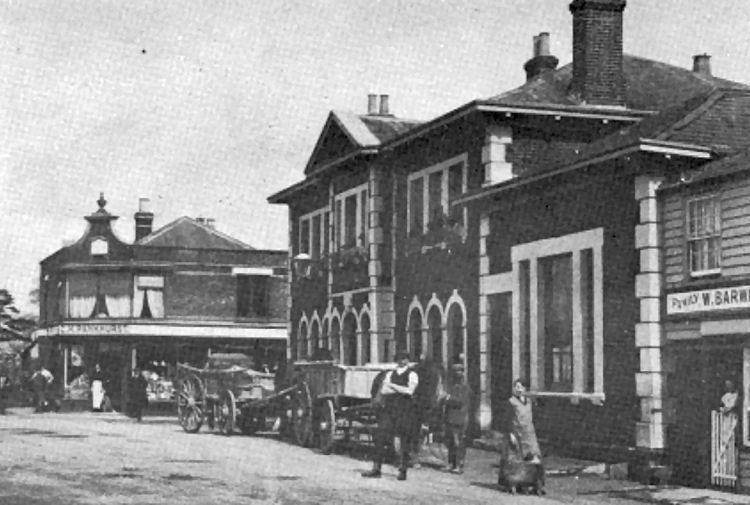
Above photo circa 1900. |
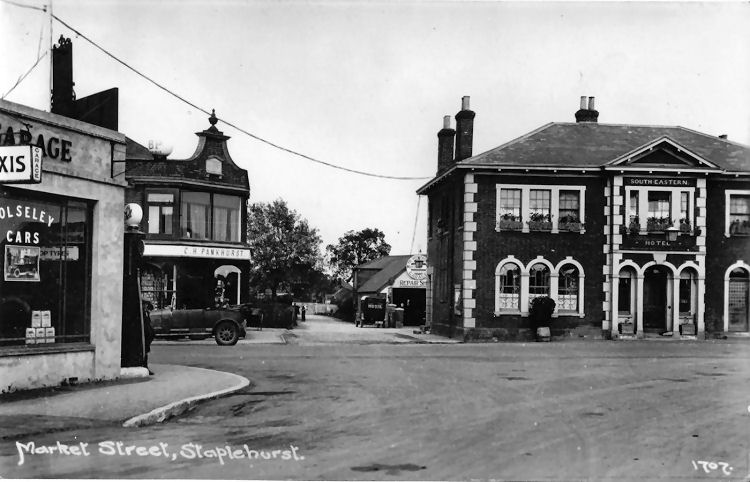
Above postcard, pre 1932. |
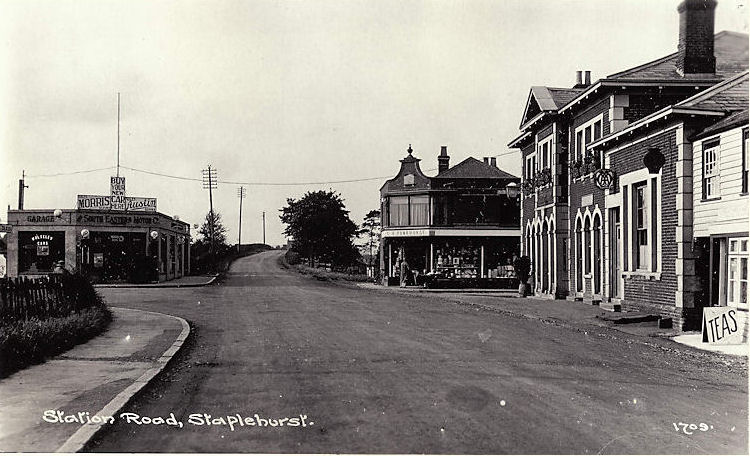
Above postcard, pre 1932. |
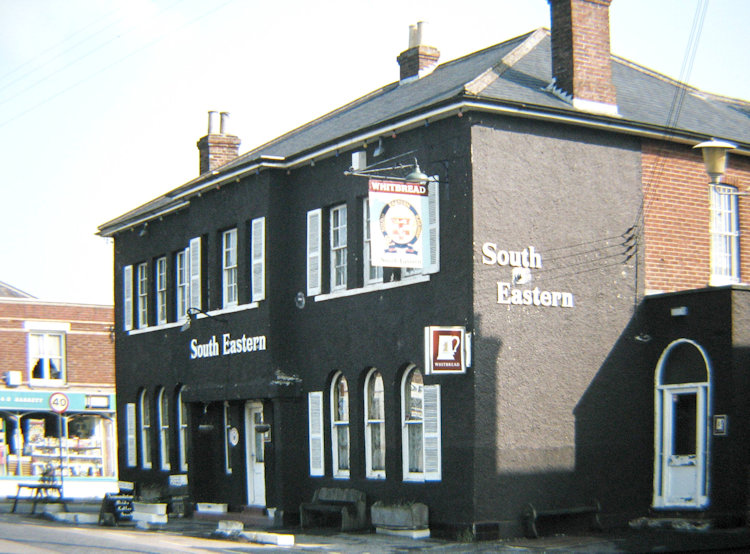
Above photo, 28 March 1983, by Jim Ashby. |
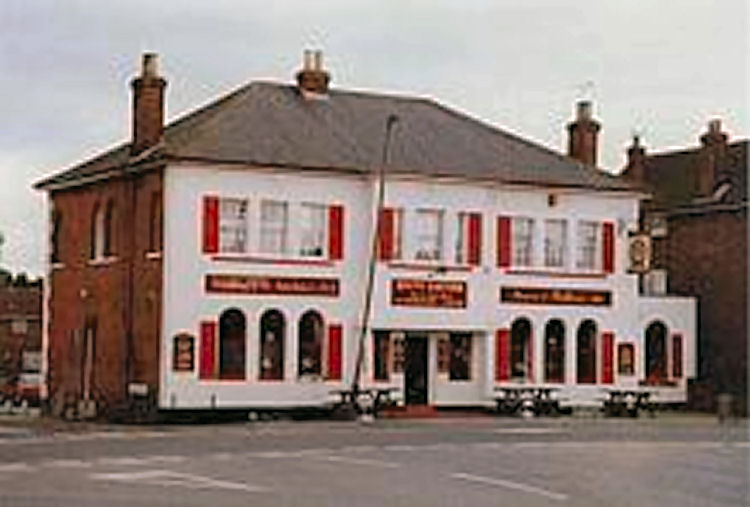
Above photo circa 1988. |
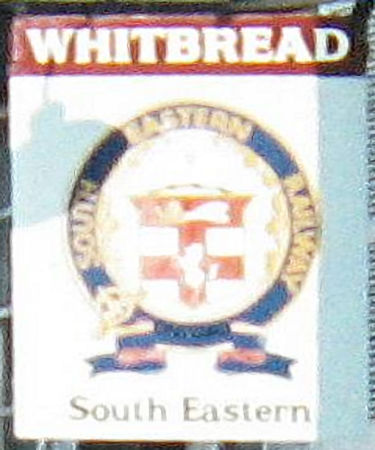
Above sign 1983. |
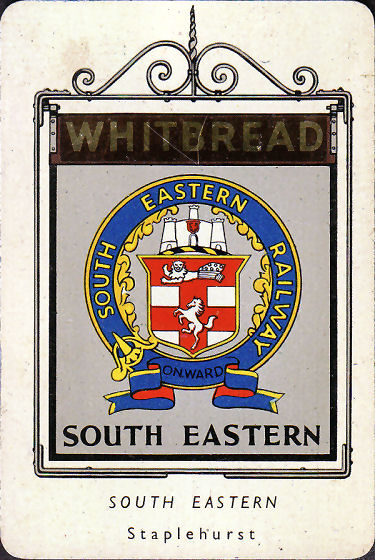 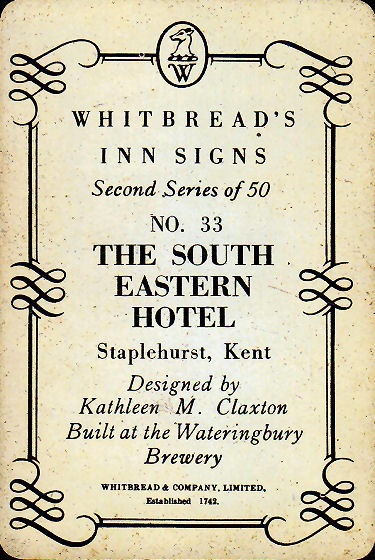
Above aluminium card issued 1950. Sign series 2 number 33. |
The one time Style and Winch public house was later sold to Frederick
Leney of the Phoenix Wateringbury Brewery.
I appear to have reference to a "Railway
Hotel" as well as this "South Eastern Hotel," and the census of 1871
makes reference to a "South Eastern Railway Hotel," so I believe the two are
one and the same. Local knowledge definitely needed here thanks.
The house was built in 1846 opposite the Staplehurst Railway Station by
Henry Hoare who also set up a shop called the Market Stores. At the time
their was no street lighting or pavement, just a muddy track beside an empty
road, with hop gardens on either side.
Sir Henry Hoare was a scion of the Hoare banking family and had a house
built about 400 yards north of the railway line, Staplehurst Place. As a
banker he probably wouldn't have been involved with the pub save perhaps to
loan the money to build it. He was a JP and Sheriff of Kent at one time.
The Railway Tavern (now closed) is a Tudor building which was probably an
old staging post. It is about 100 yards south of the "South Eastern Hotel."
The whole of that part of Staplehurst is about 1 mile north of the "Kings
Head" and the church, and probably rose as a result of the railway.
|
From the Kentish Gazette, 12 May 1846.
STAPLEHURST. In Re Isaac Beeman, Hop Factor. Boro'.
An important meeting of the creditors was held on the 1st instant, at
the "South Eastern Hotel," Staplehurst, pursuant to notice, for the
purpose of receiving and investigating the report of the committee
appointed to examine the accounts, &c. and we are enabled to give the
following detailed statements of the proceedings. The meeting was
numerously attended, and Mr. Wickham, of Goudhurst, was elected
chairman.
The report of the committee, stating they had carefully examined the
accounts and found them substantially correct, and that the offer of 5s.
in the pound was more than could reasonably be expected to be realised
by any other mode of settlement, was read.
A detailed statement of the accounts, liabilities, and assets, was
produced, and all the books of account, including the daily cash and
bankers' pass book, with the ledgers, were laid on the table for
inspection, and the clerk and accountant were present to give any
explanation required.
Mr. Piercy, Mr. Beeman's solicitor, opened the business of the meeting.
Mr. Bryant, of Hawkhurst, as chairman of the committee, stated they had
performed the important task committed to them with great anxiety to
arrive at a correct and just conclusion, and they firmly believed the
report presented by them was correct, and the composition offered
beneficial to the creditors; that in such numerous and heavy
transactions, some errors might be discovered, and some transactions
appear not free from blame or indiscretion; but the accounts on the
whole appear to have been well and correctly kept, and the deficiency of
assets clearly accounted for by too extensive and incautious credit,
which he had no doubt would operate as a useful lesson for the future,
and he thought it right to add that every facility had been given by Mr.
Beeman and his clerks, during the investigation, who had throughout
shown much anxiety to have every transaction fully examined.
Mr. Beecham, solicitor, of Hawkhurst, then stated that at the request of
the committee he had examined the books with the statement prepared by
the accountant, which had evidently been made out with great care and
correctness; that he had checked the entries from the daily transactions
into each account sufficiently to satisfy himself of their general
accuracy. He produced a list of every debtor and creditor, and a
particular statement of all the liabilities and assets, with a reference
to each account. He (Mr. B.) was satisfied the statement was correct
according to the books, which would easily he proved by any creditor
examining his own account, which he requested some of them would be kind
enough to do, in order to test the statement to that extent, and he
assured the meeting he thought the report of the committee fully
justified.
Many of the creditors then examined their accounts, and the result was
satisfactory.
Mr. Piercy then gave a statement of the recent receipts and payments,
showing that no undue preference had been given, and that the payments
to the planters had exceeded the receipts.
The Chairman then enquired whether any gentleman present wished any
further explanation; if not, he should put the resolution, that the
offer made at the first meeting to pay a composition of 5s. in the
pound, by two instalments at three and six months, to be secured by the
joint and several notes of Mr. Tooth, Mr. Oxley, and Mr. Beeman, subject
to the report of the committee (which had been read), be confirmed and
accepted.
The resolution was accordingly put and carried unanimously.
An agreement which had been prepared to carry out such arrangement,
provided the same was executed by all the creditors within one month
from that day, was then signed by all the creditors present, except two
or three, who, from particular circumstances affecting their individual
cases, required further time to consider.
|
|
Southeastern Gazette, 11 January 1853.
Petty Sessions, Thursday. (Before W. P. Croughton, Esq.,
chairman, the Rev. F. Barrow, and M. Tweedie, Esq.)
George Bennett v. James Fuller.
This information charged defendant with wilfully and maliciously
breaking a pane of glass at the "South Eastern Hotel," of which the
complainant is the landlord.
Complainant deposed:— On Friday evening, the 24th December,
between ten and eleven o’clock, the defendant came into my house,
following a gentleman and lady from the station. The defendant keeps
horses, and he was soliciting the gentleman to use his conveyance in
the morning. He was a little intoxicated and was troublesome, and I
three times civilly requested him to leave the house. He refused to
leave unless I supplied him with some brandy and water. I told him
he was not in want of it, and desired him to come in the morning if
he wished to see the gentleman. He refused to quit and was an
annoyance, and I then put him out of doors, when he deliberately
thrust his arm through a pane of glass in the hall window, which
cost 6d. to replace.
Defendant stated it was nothing but jealousy, and that
complainant’s men often insulted him. He denied breaking the window,
and said that nine out of ten words of defendant’s statement were
false.
The magistrates convicted defendant in the damage and costs.
Fuller v. Ballard.
This was a charge of assault, and arose out of the last case. The
complainant stated that on the evening of the 24th December last a
gentleman and lady came off the mail down train, when he and the
defendant, who is in the employ of Mr. Bennett, followed them,
touting for the job of providing them with with a conveyance. On
witness arriving at the steps of the hotel, the defendant swore he
should not go any further, and struck him twice in the chest.
The defendant said that on the train in question arriving, the
station-master called him into the station, and said the gentlemen
wanted beds for the night and a carriage in the morning. He took
them to the hotel, and the complainant followed, and was about to
follow the gentleman into the coffee-room, when he (defendant) put
up his arm to prevent him, but denied having struck him.
This being corroborated by a witness named Alchin, the case was
dismissed.
|
|
Southeastern Gazette, 18 January 1853.
PIGEON SHOOTING.
A GRAND MATCH will come off at the "South Eastern Hotel,"
Staplehurst, on Friday next, the 21st inst., between four of the
best shots in England. For £20 a side, at 21 birds each, usual
bounds, l 3/4oz. shot.
Barber will supply the birds. Shooting to commence precisely at
Twelve o clock.
|
|
From the Kentish Gazette, 8 December 1857.
STAPLEHURST. Gross Assault.
On Thursday night three men entered the "South Eastern Hotel," at a
late hour, and persisted in remaining some time, until, at length,
Mr. Terrington, the landlord, told them that he wished to close and
retire to bed. The men then, after some persuasion, left the house
but shortly after, one returned, and inquired for his cap. No sooner
had Mr. Terrington opened the door, than he was struck with a heavy
cudgel across the back of his head. The blow cut his head severely,
and completely stunned him. The men escaped, and medical aid was at
once procured for Mr. Terrington, who is now doing well. Two of the
men we hear, have since been apprehended, but the third is still at
large.
|
|
From the Maidstone Telegraph and West Kent Messenger, 18 December 1869.
STAPLEHURST. Sudden Death from Eating Hemlock.
On Monday last a coroner’s inquest was held at the “South Eastern
Hotel,” on the body or James King, mate to Mr Collison, Cross at Hand,
who died suddenly while carting, the Saturday previous. The jury having
viewed the body, and heard the witnesses, returned the following
verdict:- “James King died from paralysis of the heart, induced by
having eaten the root of a poisonous herb known as water-bendock, or
conium, or hemlock, the deceased having taken the same under a mistaken
notion that it would cure the scurvy, from which he was suffering.”
A
horse of Mr. Collison’s also died in consequence of eating the same
root.
|
|
Maidstone Journal and Kentish Advertiser, Monday 8 January 1872.
Felony by a sister-in-law.
Mary Miles, widow, was charged with stealing 7s. the monies of Thomas
Miles, at Staplehurst, on the 31st December. Prosecutor
keeps the "South Eastern Railway Hotel," at Staplehurst, and the
prisoner, who is his sister-in-law, has for some time past been
living in his employ, and she had access to the cash box. For about 2
months the prosecutor has missed money, and both himself
and his wife were utterly at a loss to know what could have become of
it. On Sunday morning last he marked the sum of 22s. in a
particular manner with a knife. Some of the money was in half crowns.
Some in florins and the rest in shillings, and he then placed
all the coins in the cash box in the bar. There was no other money in
the box at the time. In the evening of the same day he looked
into the box, and then found that 7s. had been taken out. He then placed
himself in communication with Superintendent Morgan,
and a search warrant being obtained, the prisoner's bedroom was
searched. In some small boxes in her room the sum of £75 in
gold and silver was found, and amongst that 7s. of the marked money.
Prisoner, who said nothing in defence, was committed for
trial. Mr. Hindz, solicitor, of Goudhurst, appearing for the prosecutor.
|
|
Sevenoaks Chronicle and Kentish Advertiser, Friday 3 February 1922.
LICENSING PROSECUTIONS.
Edward Morley and Laura Morley were summonsed for selling intoxicants
during prohibited hours at the "South Eastern Hotel," Staplehurst on
January 16th.
Mr. W. C. Cripps appeared for the defence.
P.C. Enfield deposed to seeing two men enter the house by a backdoor
after 2.30. Witness entered and saw Morely with a glass, which he said
contained a small lemon. On asking to smell it he replied, "No you
don't, I have not served it yet," and he spilled the contents on the
floor. Witness saw Mrs. Morley serving another man. He told them he
should report them, and the male defendant replied. "Well, there it is,
make it as light as you can."
Mr. W. C. Cripps, addressing the Bench emphasised the excellent
character of the landlord, against whom there was no previous complaint.
He explained that defendant had omitted to apply to the Bench for the
repeal of the D.O.R.A. (Defence Of the Realm
Act) restrictions on market days.
Sir Charles Jessel said that defendant had on a previous occasion
applied for a license to sell on market days, but the application was
opposed by the police. This left the Bench no option but to impose a
fine of £10 in each case.
Mr. Cripps then applied for permission for defendant to sell on
alternate Mondays, being market day. From 2.30 to 4.30.
Superintendent Russell opposed the application on the ground that no
similar concession had been granted anywhere in the county.
The Bench, however, granted Mr. Cripps application, and also allowed a
similar concession to the landlord of the "Railway Tavern," Staplehurst.
Alfred Nichols, Ernest Jenner, and Stephen Seymour were then charged
with consuming intoxicating liquors during prohibited hours at the
"South Eastern Hotel," Staplehurst, on January 16th.
Jenner, who said he was only drinking cyder, was fined £10, Seymour who
said he thought the house was open in the ordinary way, was fined £10
and Enfield who denied that he was drinking intoxicating liquor, was
fined 30s.
|
|
The premises was damaged by fire in 1932, and was destroyed.
|
|
From the Whitstable Times and Herne Bay Herald, Saturday 2 January 1932.
Hotel destroyed by Fire.
Serious conflagration at Staplehurst.
The "South-Eastern Hotel," Staplehurst, was almost totally destroyed by
fire in the early hours of Monday morning, and the tobacconist and sweet
shop adjoining it was burnt completely to the ground, a chimney stack
being the only part remaining. This being a wooden structure, it burnt
with incredible rapidity.
Fortunately there was no loss of life or personal injury, but the damage
to buildings and furniture is very considerable, being computed at
somewhat in the region of £5,000.
The hotel, which was built of brick and stone, was one of the most
imposing structures in Staplehurst with large and commodious rooms well
appointed, and had recently been renovated and redecorated. It is owned
by Whitbread and the licensee is Mr. E. Mosley, who has been the
proprietor for the past 27 years. The house adjoining was the property
of Mr. George Barnett and was used as a tobacconist and sweet shop by
Mrs. Smith.
The fire was discovered by Mr. William Woods a local resident, who lives
at Churchill cottages, and who when passing on his way home on Sunday
shortly after midnight, saw sparks coming from a room at the back of
Mrs. Smith's shop, which speedily burst into flames. He gave the alarm to
some people whom he saw approaching and they all rushed to the spot and
did what they could to subdue the flames which speedily got a firm hold
on the fabric of the wooden building and fanned by a gusty wind spread
with amazing rapidity.
Sergeant Belsey and P.C. Albon were quickly on the scene and the local
Voluntary Fire Brigade and Maidstone Fire Brigade were sent for. In the
meantime the police and the number of local residents who had rushed to
the scene of the conflagration to render help, did all they could in the
way of assisting the occupants of the hotel to safety and salving what
furniture could be removed in the short space of time before the intense
heat prevented further operations in this respect.
The wooden building soon became a tremendous blaze which lit up the
countryside for miles around and quickly had the side of the hotel in
it's devastating embrace, and running along the eaves, spread from room
to room; it soon became evident that this building was also doomed.
The Maidstone fire brigade, under the command of Captain Wainscott,
arrived in good time, after receiving the call and were on the scene
about 12:55. Their efforts, however were greatly hampered for some time
after their arrival by lack of water, which they were unable to obtain
from an adjacent hydrant. The failure of this necessitated their going
to a pond opposite, on Horns Lodge Farm, and in order to do this they
had to cross a field, and it was only with great difficulty that the
engine was got over the soft ground to the pond. Here however, there was
a plentiful supply of water and the work of the Maidstone Brigade,
assisted by the local brigade, as soon very effective.
By this time, however, it was impossible to save the hotel, which was
almost completely gutted, the walls and two rooms only remaining the
adjoining wooden building having collapsed in the early stages of the
outbreak.
The fire was finally extinguished about daybreak.
At the time of the fire there were no guests at the hotel, the Christmas
guests having left for the last train on the previous evening. Mr.
Mosley, the proprietor, was loathe to leave his home, and his friends
had difficulty in prevailing upon him to do so. He and Mrs. Moseley and
the hotel staff and also Mrs. Smith have been provided with temporary
accommodation for the kindness of friends.
A sum of £40 in money was successfully salvaged and some of the
furniture.
Several valuable pictures and some very fine pieces of furniture were
destroyed, also a considerable quantity of spirits, wines and beer.
At the time of the outbreak the tobacconists shop was unoccupied, Mrs.
Smith having gone out to a party.
It is thought that the fire probably originated through an oil lamp
which had been left hanging on the wall.
|
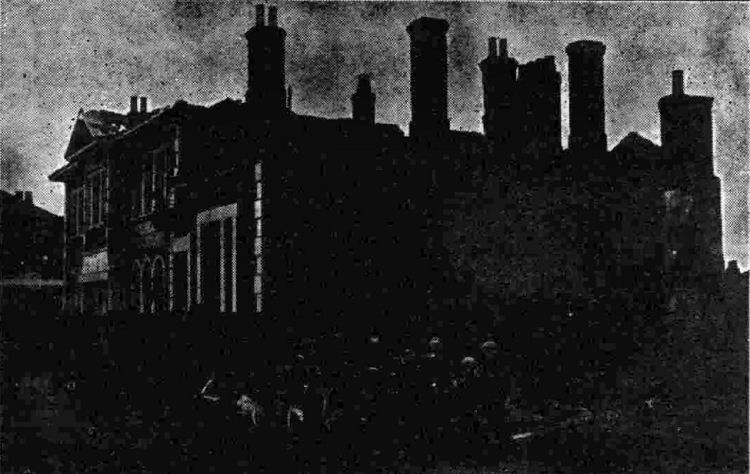
Above photo, 1932 after the fire. |
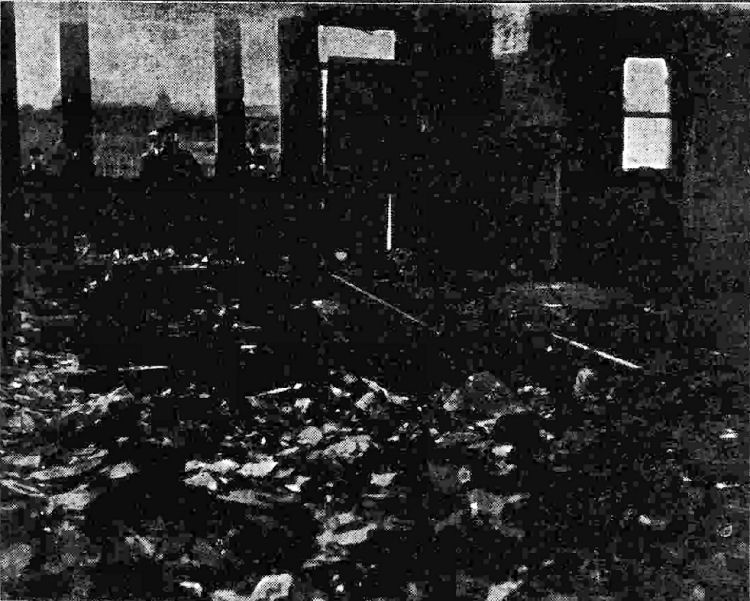
Above photo, 1932 after the fire.
|
|
From an email received 18 July 2021.
Hello,
I was very excited to find the photos of and information about the
Roebuck Inn, 41 Weeks Street, Maidstone because I have been researching
my ancestry for a number of years and the "Roebuck" is where my great
grandparents were in the final years of their lives.
Although I was born in Maidstone I grew up and am still living in
Canada. I
hope that you will find the following of some interest.
My maternal family were publicans, licensed victuallers, innkeepers in
Kent beginning with my Great, Great Grandfather, James C. Miles, who,
upon inheriting 150 pounds from his father, John, in 1848, bought the
"George," Trotterscliffe, Kent from Stedman Shrubsole in 1849.
In the Census of 1851 and 1861, James is noted as a Publican of the
"George Inn." James died in 1865 leaving his effects to his son John.
However, James' wife Eliza nee Jeffery, continued to run the George. In
the Census of 1871, Kelly's Directory of 1874 and of 1882, she is listed
as Mrs. Eliza Miles, Publican, "George," Trottescliffe. In 1882 Eliza sold
the George to Frederick Leney and Sons of Phoenix Brewery, Wateringbury.
When Eliza died in 1886, she named her son Thomas Miles 'Innkeeper,
Cranbrook" sole executor.
Thomas Miles, my Great Grandfather, followed in his parent's footsteps
when between 1867 and 1868 he became the Innkeeper of the
"South Eastern
Railway Hotel," Staplehurst, Kent. In the Census of 1871 and Kelly's
Directory of 1874, he is noted as the Innkeeper and Publican of the
S.E.R.Hotel (my abbreviation), Staplehurst.
Between 1875 and 1876, Thomas took over the "George Hotel," Stone Street, Cranbrook, Kent. In the 1881 Census, he is a licensed victualler of the
"George Hotel" whereas in the 1891 Census, he is a publican. Between 1878
and 1895, Thomas is also an agent for the
"South Eastern Railway Hotel,"
and between 1884 and 1885 a wine and spirit merchant from the "George
Hotel."
When Thomas moved on to the "George Hotel" in Cranbrook, he left the
operation of the "S.E.R. Hotel" to his brother-in-law, William Allingham
who, in the 1881 Census is noted as a Hotel Keeper employing 3 women and
1 man. William died in 1887 and his sister, Sarah Ann Allingham, who had
been working for him took over. Great Aunt Sally, as she was known to
the family was Hotel Keeper and Proprietor of
"S.E.R. Hotel" Staplehurst
until her marriage in 1905. She is listed as such in all of the Census'
and Directories between those dates.
In 1896, Thomas Miles turned over the "George Hotel," Cranbrook to his son
James Arthur Miles who continued there until 1912. Thomas, his wife Ann
nee Allingham, and his daughter, Evelyn Margaret (my Grandmother) moved
on to the "Roebuck Inn," 41 Weeks Street, Maidstone where he is listed in
Kelly's Trade Directory 1899. On 23 December 1900, Thomas died at the
"Roebuck" and left all of his effects to his wife Ann. In the 1901 Census,
Ann Miles is listed as a Licensed Victualler at the "Roebuck Inn," 41
Weeks Street, Maidstone.
Ann Miles Died at the "Roebuck" 22 April 1902 and left all of her effects
to my Grandmother, Evelyn Margaret, who had been a barmaid at the
"Roebuck." However, she left to live and be married later in 1902 with
Great Aunt Sally at "S.E.R. Hotel" in Staplehurst.
Although I have photos of many of my family members, they are relatively
formal and none are taken at the various hotels and inns other than my
Grandmother's wedding in the garden of the
"S.E.R. Hotel" but it
does not show the building.
Thank you for all you do,
Marilyn White. |
LICENSEE LIST
HOARE Henry 1846 (banker)
BENNETT George 1851-61+ (age 38 in 1851 ) )
TERRINGTON Mr 1857
MILES Thomas 1871-74+
 (age 31 in 1871 (age 31 in 1871 ) )

ALLINGHAM William 1881+ (age 35 in 1881 ) )
ALLINGHAM Sarah 1891+ (age 35 in 1891 ) )
POPE George 1901+ (age 41 in 1901 ) )
MORLEY/MOSLEY Edward & Laura 1911-22+ (age 39 in 1911 ) )
DRESH Brian 1977-83
TAYLOR Mike after 1970s
 Census Census
 From the Kelly's Directory 1874 From the Kelly's Directory 1874
|









